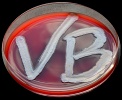| Species/Subspecies: | Actinobacillus suis | ||||||||||||
|---|---|---|---|---|---|---|---|---|---|---|---|---|---|
| Etymology: | Genus name: small ray rod. Species epithet: from pigs. | ||||||||||||
| Significance: | [Important] | ||||||||||||
| Taxonomy: | Class Gammaproteobacteria Order Pasteurellales Family Pasteurellaceae Genus Actinobacillus |
||||||||||||
| Type Strain: | ATCC 33415 = CCUG 11624 = NCTC 12996 | ||||||||||||
| Macromorphology (smell): | |||||||||||||
| Micromorphology: | Non motile rod, usually 0.3-0.5 x 0.6-1.4 µm, but can also be more variable in length. | ||||||||||||
| Gram +/Gram -: | G- | ||||||||||||
| Metabolism: | Fakultativt anaerob | ||||||||||||
| Catalase/Oxidase: | +/V | ||||||||||||
| Other Enzymes: | Esculinase +, ornithine decarboxylase -, tryptophanase -, urease + | ||||||||||||
| Biochemical Tests: | Methyl red -, Voges-Proskauer -, hydrogen sulfide - | ||||||||||||
| Fermentation of carbohydrates: | D-glucose + lactose + maltose + L-rhamnose - sucrose ? L-arabinose + cellobiose + D-mannitol - salicin + trehalose + glycerol - inulin + raffinose ? D-sorbitol - starch v |
||||||||||||
| Spec. Char.: | Does not require V-factor (NAD or NADPH) for growth. Cf. other Actinobacillus spp. | ||||||||||||
| Special Media: | |||||||||||||
| Disease: | See table
|
||||||||||||
| Genome Sequence: |
|
||||||||||||
| 16S rRNA Seq.: |
| ||||||||||||
| Taxonomy/phylogeny:
|
About 18 species have been described within genus Actinobacillus, but the relationship between members within the closely related genera Actinobacillus, Haemophilus, Mannheimia and Pasteurella is very uncertain since none of these genera forms monophyletic clusters. | ||||||||||||
| Updated: | 2023-03-29 |
